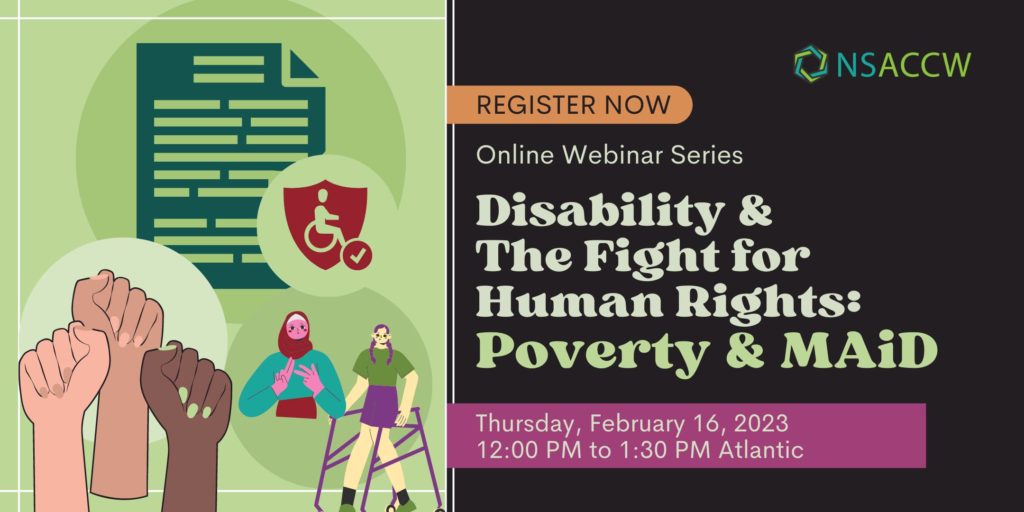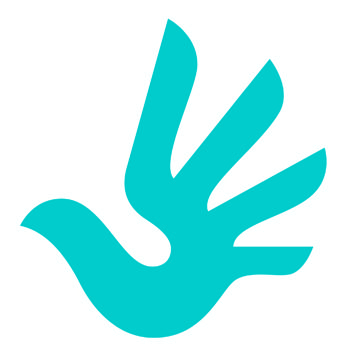Feb 16
Disability & The Fight For Human Rights: Poverty & MAID

Explore the codependency of poverty, disability and violence, and the rise in the suggestion and perception of MAID as a solution to poverty
By Nova Scotia Action Coalition for Community Well-Being
When and where
Date and time:
Thu, 16 February 2023, 12:00 PM – 1:30 PM AST
Location:
Online
About this event
1 hour 30 minutes
Mobile eTicket (to reserve a free spot click here)
30% of Nova Scotians 15 years and older have at least one disability. People living with disabilities are found to be disproportionately living in low-income. They also have to grapple with the constant denial of their human rights in our society, in addition to being infantilized and dehumanized.
In NSACCW’s three part-webinar series, we explore the structural violence that enables the interrelation and codependency of poverty, disability and violence. To watch the first of three webinars, click here.
Join us for our next webinar on Thursday, February 16, 12:00 to 1:30 PM, as we explore Medical Assistance in Dying (MAID). Originally intended to provide dignity in dying, there has been a recent rise in the suggestion, use and perception of MAID as a possible solution to people with disabilities as they navigate poverty, and the difficulties in accessing the basic necessities of living a dignified life. In this webinar, we’ll explore the correlation between poverty and MAID, through stories of people and discussions on the role social circumstances and policies play in their intersections.
Moderated By Jeffrey Kirby is a (retired) Professor in the Department of Bioethics of the Dalhousie University Faculty of Medicine who has a combined background in medicine, philosophy and health care ethics. His academic and research interests include: the ethics analyses of complex health care practices, medical assistance in dying, mental health care ethics, critical care ethics, organ donation and transplantation ethics, the ethics of assisted reproduction, and socially- just health policy development through the use of deliberative engagement methodologies.
Catherine Frazee OC, D.Litt., LLD. (Hon.), is Professor Emerita in the School of Disability Studies at Toronto Metropolitan University and former Chief Commissioner of the Ontario Human Rights Commission. Her primary focus is on the human rights implications of state-sanctioned regimes for assisted suicide; in this capacity she has testified at numerous legislative committees and legal interventions. She is a founding Advisor to the Vulnerable Persons Standard and proud co-creator of the Disability Filibuster against Bill C7. An edited collection of many of her lectures and public presentations, titled Dispatches from Disabled Country, will be published by UBC Press in May 2023.
Marika Warren is an Assistant Professor in the Dalhousie Department of Bioethics and Network Ethicist for the Nova Scotia Health Ethics Network. Marika has a longstanding interest in the intersection of values and science and in how we translate values into practice, alongside a strong commitment to social justice. Marika’s current work focuses on developing innovative ways to ensure that ethical commitments and values are reflected in healthcare practice, supporting providers in the challenging work of closing gaps that sometimes arise between how we believe we should behave and how we actually do act. Areas of particular interest include addressing stigma, promoting equity, and supporting decision making. Trained in philosophy, Marika’s dissertation focused on disability rights claims and other past work has looked at addressing stigma in medical education and ethical questions related to addressing equity, diversity, inclusion, and accessibility (EDIA) issues in simulated patient settings. Current projects include work on a public health ethics framework, policy regarding human milk sharing, medical assistance in dying, and simulating ethics consultations.
